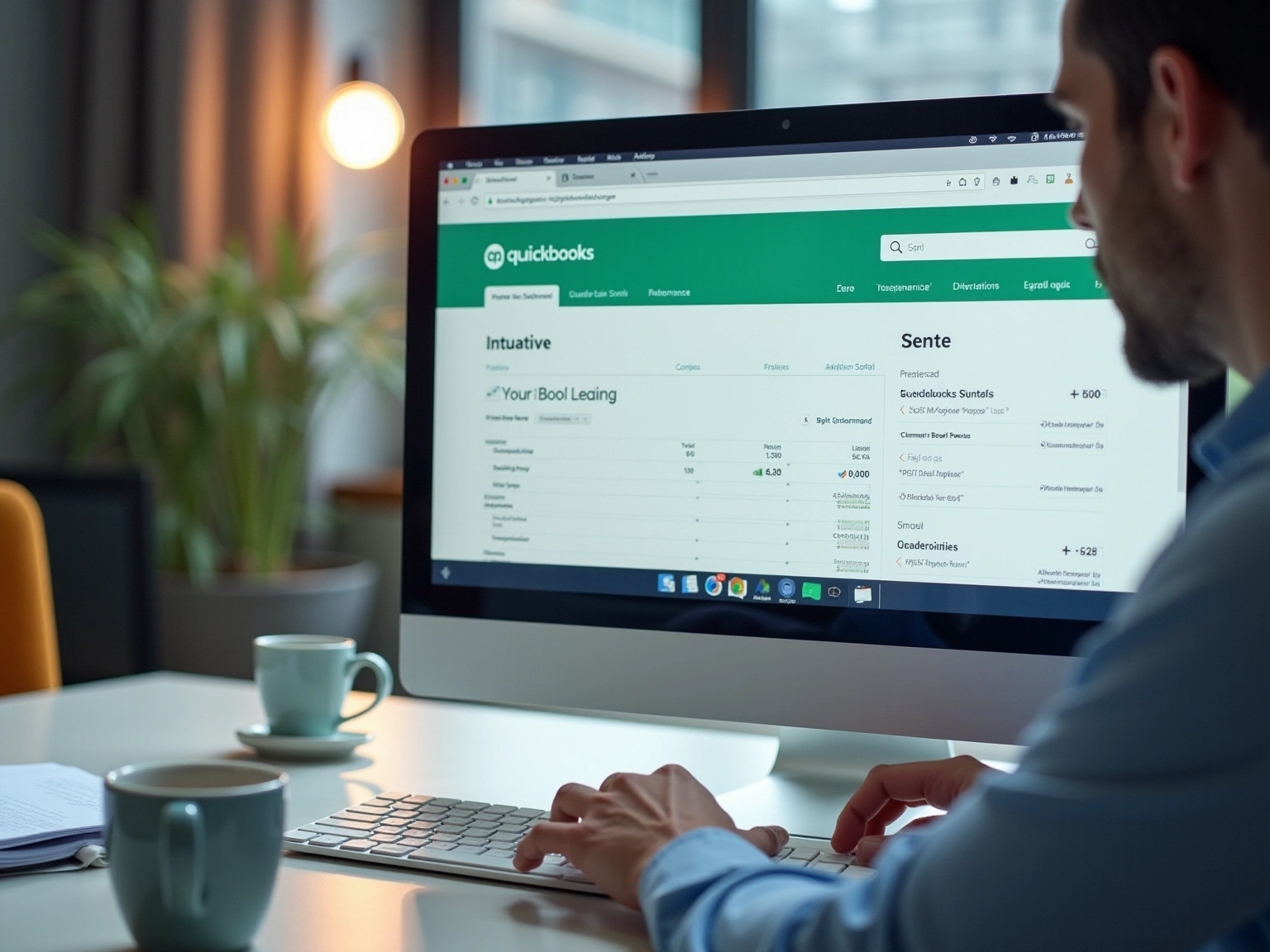Overview
This article presents a comprehensive comparative analysis of leading bookkeeping software options tailored for accountants, specifically focusing on QuickBooks, Xero, FreshBooks, and Glasscubes. Each platform is uniquely designed to meet varying needs and preferences within the accounting profession. By detailing the distinctive features, pricing structures, and user-friendliness of these tools, the article illustrates how they significantly improve efficiency and enhance the user experience in financial management for professionals.
As accounting managers face increasing challenges in managing finances effectively, exploring these advanced solutions becomes imperative. Glasscubes, in particular, stands out for its ability to address these pressing issues, making it a formidable choice among its peers. The insights provided here not only serve to inform but also encourage accountants to envision their success through the adoption of these platforms.
In summary, the analysis underscores the importance of selecting the right bookkeeping software, prompting professionals to take action and elevate their financial management practices.
Key Highlights:
- QuickBooks is the market leader, known for its extensive features and user-friendly interface, making it popular among firms.
- Xero offers strong integration capabilities and real-time collaboration tools, enhancing teamwork among users.
- FreshBooks specialises in invoicing and expense tracking, ideal for freelancers and small businesses seeking simplicity.
- Glasscubes improves customer interaction for UK financial professionals with centralised communication and automated notifications.
- Bookkeeping software can save finance departments thousands of hours annually, boosting operational efficiency.
- QuickBooks includes invoicing, payroll, and tax preparation with extensive third-party integrations.
- Xero features a user-friendly dashboard and real-time financial reporting, suitable for collaborative environments.
- FreshBooks’ unique user portal allows secure document sharing and automated reminders, significantly improving communication.
- Pricing varies among software, with QuickBooks starting at $25/month, Xero at $12/month, and FreshBooks at $15/month.
- Glasscubes offers support packages, enhancing user engagement and operational efficiency with unlimited storage capabilities.
- Usability is crucial for adoption; QuickBooks, Xero, and FreshBooks are designed for ease of use, catering to diverse user backgrounds.
Introduction
In the rapidly evolving landscape of accounting, selecting the right bookkeeping software is crucial for enhancing efficiency and fostering client engagement. As we look ahead to 2025, several standout solutions have emerged, each uniquely tailored to meet the diverse needs of accounting professionals:
- QuickBooks continues to dominate the market, renowned for its comprehensive features and intuitive interface.
- Xero stands out for its exceptional real-time collaboration and integration capabilities, making it a favourite among teams.
- FreshBooks is designed specifically for freelancers and small businesses, offering streamlined invoicing and expense tracking that simplifies financial management.
- Glasscubes provides specialised tools crafted for UK accountants, significantly improving communication and client relations.
This article will explore the key features, pricing structures, and usability assessments of these leading software options, equipping accountants with the insights necessary to make informed decisions that align with their operational requirements.
Overview of Leading Bookkeeping Software for Accountants
In 2025, several bookkeeping software for accountants options stand out as essential tools for financial professionals, notably:
- QuickBooks
- Xero
- FreshBooks
QuickBooks continues to dominate the market, celebrated for its extensive features and intuitive user interface, making it the preferred choice for numerous firms. Xero distinguishes itself with robust integration capabilities and real-time collaboration tools, facilitating seamless teamwork among users. FreshBooks excels in invoicing and expense tracking, specifically catering to freelancers and small businesses that prioritise simplicity and efficiency.
Meanwhile, Glasscubes is tailored for UK financial professionals, significantly enhancing customer interaction through effective data collection and automated notifications. This platform effectively mitigates common pitfalls associated with traditional email communication, such as misplaced responses and duplicated requests, by providing a centralised hub for all correspondence related to audit requests. With features like visual progress reports and organised response tracking, Glasscubes ensures that all inquiries are managed promptly, fostering trust in your company while drastically reducing the time spent on communication.
Furthermore, Glasscubes is secure, encrypted, and GDPR compliant, offering peace of mind for both accountants and clients. Notably, bookkeeping software for accountants can save finance departments thousands of hours each year, underscoring the efficiency of these solutions. Each bookkeeping software for accountants presents unique benefits, addressing diverse accounting needs and preferences, thereby empowering firms to select the optimal choice for their operational requirements. Additionally, the market share of these solutions in 2025 reflects their popularity and effectiveness within the accounting industry.
Key Features Comparison: Functionality and Integration
In the realm of bookkeeping software for accountants, QuickBooks stands out for its comprehensive accounting tools, which include invoicing, payroll, and tax preparation, all enhanced by extensive third-party integrations. Backed by Intuit, QuickBooks enjoys a credible market position that significantly boosts its appeal.
Meanwhile, Xero sets itself apart with a user-friendly dashboard and real-time financial reporting, making it particularly effective in collaborative environments.
FreshBooks excels in invoicing and time tracking, specifically catering to service-oriented businesses. This platform features a distinctive user portal designed for secure document sharing and automated reminders, which significantly reduces the time professionals spend on follow-ups. Users have reported saving an impressive 288 hours in a single tax season, alongside a 40% increase in customer response rates, underscoring its effectiveness in enhancing communication and engagement.
The company not only provides an organised tool that alleviates the inconveniences of repeated requests and lost information but also ensures real-time monitoring and clear communication channels, aligning both financial professionals and customers. This targeted approach boosts efficiency and addresses the common frustrations professionals face in information gathering, particularly the limitations of conventional email communication, which often leads to lost messages and duplicated efforts.
Integration capabilities differ among these platforms; QuickBooks and Xero support a wide array of applications, enhancing their versatility. QuickBooks’ extensive integrations facilitate seamless connections with various financial tools, while Xero’s real-time reporting capabilities promote collaborative work.
However, FreshBooks, as bookkeeping software for accountants, is specifically designed to enhance communication with customers, focusing on their unique needs. Its integration features streamline workflows and encourage a more structured approach to handling client data, distinguishing the platform in the competitive accounting software market.
Pricing Analysis: Cost-Effectiveness and Value
Pricing for bookkeeping software in 2025 reveals significant variation, reflecting the diverse needs of accounting professionals. QuickBooks presents tiered pricing plans starting at $25 per month, with costs increasing based on the features selected. Xero enters the market with a competitive starting price of $12 per month for its basic package, while FreshBooks follows closely with plans beginning at $15 per month. Gridlex offers a cost-effective solution at $10 per user per month, and SAP ERP is available at £38 per month, providing asset management and procurement features. Although not the lowest-priced option, SAP ERP delivers exceptional value through tailored support packages designed specifically for accountants.
- Bronze Package: £1,500 per annum
- Uptime guarantee: 99.9%
- Guaranteed time to first reply: <24 hours
- Email support and online chat support
- Gold Package: £4,500 per annum
- Uptime guarantee: 99.9%
- Guaranteed time to first reply: <1 hour
- Email support, online chat support, and phone support (subject to fair usage policy)
When assessing cost-effectiveness, firms must look beyond mere monthly fees. For instance, the platform has demonstrated significant time savings, with users reporting an impressive 288 hours saved in one tax season, as noted by Sophie Montgomery of TaxAssist Accountants. This efficiency translates into a 40% increase in customer response rates and a 50% reduction in response times, underscoring the platform’s ability to enhance workflows. Furthermore, the automated reminders and real-time reporting capabilities of the bookkeeping software for accountants empower finance teams to focus more on strategic activities rather than administrative follow-ups, thereby enhancing its value proposition. In conclusion, when evaluating bookkeeping software for accountants, financial professionals should consider both the pricing models and the potential advantages, such as time savings and improved interactions, that each bookkeeping software for accountants solution can provide. Glasscubes stands out as a solution that not only streamlines user engagement but also maximises efficiency through its user-friendly onboarding and unlimited storage capabilities.
Usability Assessment: User Experience and Accessibility
Usability is a critical factor in the adoption of bookkeeping software, significantly influencing how swiftly and efficiently users can integrate these tools into their workflows. QuickBooks distinguishes itself with its intuitive interface, accommodating users from various technical backgrounds, which has led to its widespread popularity. Success stories from QuickBooks users underscore its effectiveness in streamlining accounting processes. Similarly, Xero emphasises user experience with a clean design and straightforward navigation, positioning it as a formidable competitor in the market. FreshBooks excels in ease of use, specifically targeting those without accounting expertise, appealing to freelancers and small business owners seeking simplicity in their financial management.
Glasscubes sets itself apart with a unique user portal that requires no training, enabling financial professionals to engage with users effectively without the burden of a steep learning curve. This feature is particularly advantageous in a fast-paced environment where time is of the essence. Moreover, Glasscubes offers an automated reminder function, allowing users to send up to 10 reminders on a simple schedule, or an unlimited number with customisable schedules, enhancing communication with customers and ensuring that critical deadlines are met. This capability effectively addresses common frustrations in customer information requests, such as lengthy email threads and repeated inquiries, which can hinder workflow efficiency, particularly when using bookkeeping software for accountants. Case studies demonstrate that firms adopting user-friendly platforms encounter higher adoption rates and improved client interactions.
Furthermore, the top three challenges during ERP implementation—insufficient testing, inadequate process reengineering, and data accuracy issues—highlight the necessity of proper implementation in achieving effective utilisation of bookkeeping software for accountants. As the landscape of accounting software evolves, the emphasis on usability will continue to shape the tools that accountants select, ultimately driving efficiency and accuracy in their practises. Trends such as the increasing use of AI and enhanced data security measures are transforming accounting practises, further influencing the usability of these tools.

Conclusion
Selecting the right bookkeeping software is pivotal for accountants aiming to enhance efficiency and client engagement as we move into 2025. QuickBooks stands out as a market leader with its comprehensive features, while Xero excels in real-time collaboration. FreshBooks is tailored specifically for freelancers and small businesses, offering streamlined invoicing capabilities, and Glasscubes presents a unique solution designed for UK accountants, enhancing communication and client relations.
The key features of these software solutions underscore their diverse functionalities, from QuickBooks’ extensive integrations to Glasscubes’ focus on bolstering client communication through automated reminders and secure document sharing. Each platform offers a distinct set of advantages, empowering firms to select according to their specific operational needs.
Pricing analysis reveals a spectrum of options, enabling accountants to evaluate both cost-effectiveness and value. Although Glasscubes may not be the lowest-priced solution, its substantial time savings and improved client response rates illustrate its value in optimising workflows.
Ultimately, usability remains a critical factor in the adoption of these tools. User-friendly interfaces and accessible features can significantly enhance the integration of bookkeeping software into accounting practices. As firms increasingly prioritise software that not only meets functional needs but also elevates user experience, the right choice can lead to improved efficiency and heightened client satisfaction.
In summary, the right bookkeeping software has the potential to transform accounting practices, making it essential for professionals to evaluate their options meticulously. By understanding the unique offerings of QuickBooks, Xero, FreshBooks, and Glasscubes, accountants can make informed decisions that align with their operational goals, paving the way for a more efficient and engaged future in the accounting landscape.
